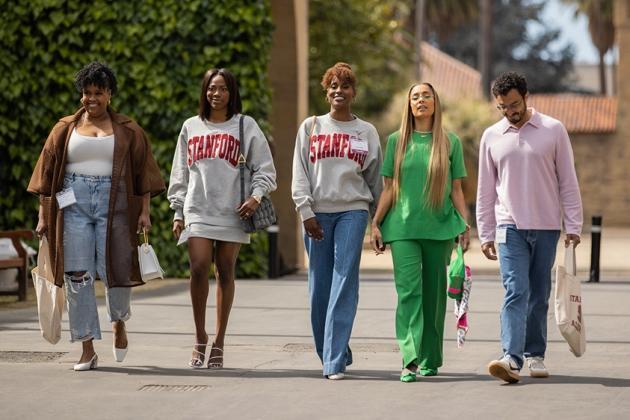
It’s easy — and perhaps a bit lazy — to posture that 2021 was a year like no other. In fact, not only was there a global pandemic, but the angst over film, theater attendance and the future of entertainment went along in lockstep. As the Hollywood awards season marches on with the Critics’ Choice Awards taking place on March 13 at the Fairmont Century Plaza Hotel, the productions up for consideration include different elements of escapism while steadfastly sidestepping an exact replication of the current pandemic, a paradigm also set by the past.
Ryan Lintelman, the Smithsonian’s National Museum of American History entertainment curator, points out that theater owners worried about the future of their business during the 1918 flu pandemic as well, wondering if audiences would favor intimate fireside chats at home over the big screen.
More from Variety
And, just over 30 years later, theater owners had a new worry: television. “That’s when [movie] productions switched to color,” says Lintelman. “It was a way to compete with television. You’re watching black and white at home [but] if you come out to the theater and pay, you can see color.”
Some of that transitional period was exemplified in “WandaVision” as the show cycled through traditional sitcom conventions, including the change from black and white into color. “WandaVision” earned four Critics’ Choice Award nominations, including limited series. Creator and showrunner Jac Schaeffer says the series’ mashup of tropes from popular shows of the past was a “comfort food of entertainment.”
Its themes about grief and entrapment resonated for audiences during this backdrop of the pandemic. “There’s joy [in three -camera sitcoms], there’s hardship and struggles and lessons,” says Schaeffer of the format’s familiarity. “You see those visuals, and know it’s all going to work out.”
That’s not to say there won’t be difficult junctures, both in life and on screen. Even the most powerful superheroes have human experiences. “It’s very much about the shades of gray … Is [Wanda Maximoff] a good guy? Is she a villain? It becomes irrelevant. It’s about her true emotional experience,” Schaeffer says.
While superheroes don’t live in the same universe as the character in the feature film “CODA,” which is up for four Critics’ Choice Awards including best picture, there is similarity in their joint exploration of emotion. Producer Philippe Rousselet says, “It’s a feel-good movie [and yet] an emotional film. You laugh [and] you cry.”
Rousselet says the film would have been successful in any year, but the pandemic gave it additional meaning. Though it’s loosely based on a French film that Rousselet also produced, he credits writer-director Siân Heder for how she “dug deeper into the characters and what it is to be part of the deaf community and what it means in their daily lives” for the American version.
Though Rousselet initially anticipated seeing “CODA” on the big screen, that’s the case for far fewer projects these days. “We need to live in the new world,” says Rousselet of the decision to go with Apple TV Plus for distribution. “I think most important is for the movie to be shown to the largest audience possible.”
As to what people have wanted to watch during prior crises, the films and television shows now reflect the past as well. Even during major events such as the Great Depression much of what was popular was glamorous escapism. The Fred Astaire and Ginger Rogers films of that era are paralleled by shows now that make it “easy to imagine yourself in a different time where everything’s glamorous and fun,” says Lintelman.
Audiences clearly need that escape and showed their support in theaters, propelling “Spider-Man: No Way Home” to success as the third top grossing film of all time, knocking “Avatar” down a rung.
And, while grittier fare has been popular during other difficult times in history, it’s always in a way that may reflect underlying darkness that provides an on-screen catharsis without actually re-creating it in the moment. Lintelman relates this to the popularity of the global phenomenon of Netflix’s “Squid Game.” It’s not to say a brilliant film that takes place during the pandemic won’t come later, but that no one needs to watch it while living it concurrently.
The fifth and final season of “Insecure” found itself nominated for best comedy series for the first time at the Critics’ Choice Awards, though Issa Rae has been nominated twice before for her performance in the series. This year the show stepped into the comedic escapism void for loyal audiences. Prentice Penny, the series’ showrunner and oft-times director, says there were long discussions about how much to involve the real-world pandemic within their curated microcosm on screen.
The season was developed pre-vaccine and the team questioned if they were “being ignorant by not showing these things,” says Penny. At the same time, “you still have to exist as human beings. You’re still falling in love or falling out of love, or dealing with parent drama, friend drama, kid drama. We wanted the show to feel human.”
They adopted the method that worked well in prior seasons: current events weren’t necessarily depicted on screen, but they informed the series’ overall mood. It was a way to “give people 30 minutes of a reprieve to just exist,” notes Penny.
Implementing that plan proved more difficult than audiences may have realized. Zoom meetings for the comedy team meant pitched jokes were met with silences as everyone politely kept themselves on mute.
Or, entire set-ups were pitched soundlessly before the speaker realized they needed to unmute themselves. Even the traditional writers’ room environment of scribes jumping into the conversation and building on each other’s jokes had to evolve. By the time someone unmuted, the
moment had passed. Notes Penny: “The energy [was] just like dial-up internet.”
Penny thinks the fact that they were on the show’s final season helped since everyone wanted to give the characters a good sendoff knowing there wouldn’t be another chance to come together again in the same way. “The fact that people love the season so much is a testament to the writers because it’s so hard to do that and be funny over Zoom,” Penny says.
While audiences have flipped on the television for a variety of programming, the team behind “King Richard,” which has five Critics’ Choice noms including best picture, gave people dual opportunities to see the film on the big screen or streaming for the first month.
Producer Tim White says the family-friendly film connected with audiences because “it takes people to a place and story that they don’t know [through Venus and Serena Williams whom] people do know and are already invested in.”
While the project is feel good, it doesn’t resolve exactly as expected. “It’s not your sort of conventional form of escapism [and] I think people were a little surprised when she loses and that was kind of the end of the movie,” White says. “But that is what happened. And I think it worked really well for what we were trying to do.”
Unlike with the similar ending to “Rocky,” which White says the filmmakers discussed, audiences know what happens with the tennis greats without a sequel.
When it comes down to it, “no matter what else is happening, and what the fad of the moment is, at the end of the day, everyone in this town still gets really excited about a great script,” he says.
In the case of these four projects, all up for multiple awards, it’s not just the town that’s excited, but audiences as well.
TIPSHEET
WHAT: Critics Choice Awards
WHEN: March 13
WHERE: Fairmont Century Plaza Hotel
WEB: criticschoice.com
Best of Variety
Sign up for Variety’s Newsletter. For the latest news, follow us on Facebook, Twitter, and Instagram.




